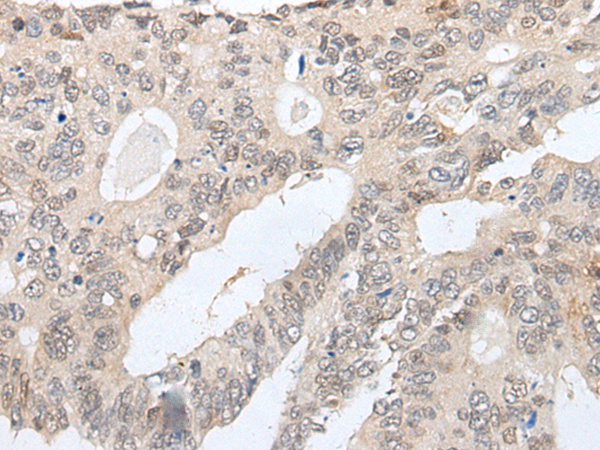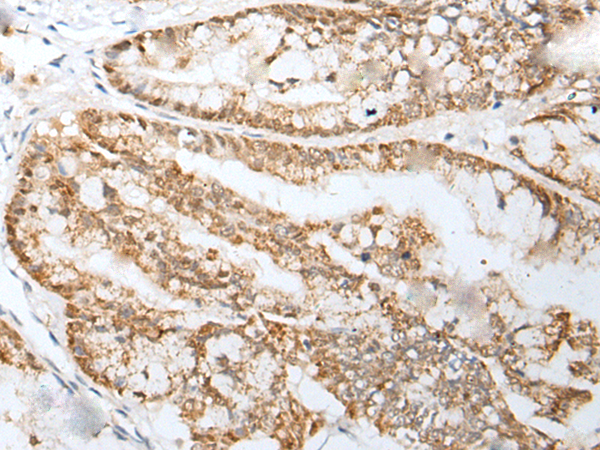

| WB | 咨询技术 | Human,Mouse,Rat |
| IF | 咨询技术 | Human,Mouse,Rat |
| IHC | 1/25-1/100 | Human,Mouse,Rat |
| ICC | 技术咨询 | Human,Mouse,Rat |
| FCM | 咨询技术 | Human,Mouse,Rat |
| Elisa | 1/5000-1/10000 | Human,Mouse,Rat |
| Aliases | KD; AIS; AR8; TFM; DHTR; SBMA; HYSP1; NR3C4; SMAX1; HUMARA |
| Host/Isotype | Rabbit IgG |
| Antibody Type | Primary antibody |
| Storage | Store at 4°C short term. Aliquot and store at -20°C long term. Avoid freeze/thaw cycles. |
| Species Reactivity | Human, Mouse, Rat |
| Immunogen | Synthetic peptide of human AR |
| Formulation | Purified antibody in PBS with 0.05% sodium azide and 50% glycerol. |
+ +
以下是3-4条关于雄激素受体(AR)抗体的参考文献,包含文献名称、作者及摘要概括:
---
1. **文献名称**:*Cloning and characterization of the androgen receptor cDNA from human prostate*
**作者**:Tilley WD, et al.
**摘要**:该研究首次克隆了人前列腺雄激素受体(AR)的cDNA,并制备了特异性AR抗体,用于检测AR在正常和癌变组织中的表达差异,为后续AR功能研究奠定了基础。
---
2. **文献名称**:*Androgen receptor gene amplification and protein expression in hormone-refractory prostate cancer*
**作者**:Scher HI, et al.
**摘要**:通过免疫组化(使用AR抗体)和基因分析,揭示了前列腺癌耐药性与AR基因扩增及蛋白过表达的相关性,为靶向治疗提供了分子依据。
---
3. **文献名称**:*Mutation of the androgen-receptor gene in metastatic androgen-independent prostate cancer*
**作者**:Taplin ME, et al.
**摘要**:利用AR抗体检测转移性前列腺癌样本,发现AR基因突变导致受体结构改变,从而影响拮抗剂的结合效率,解释了部分患者对激素治疗无响应的机制。
---
4. **文献名称**:*Phosphorylation of the androgen receptor regulates its transcriptional activity*
**作者**:Gioeli D, et al.
**摘要**:通过Western blot(依赖AR抗体)和功能实验,阐明AR磷酸化对其转录活性的调控作用,揭示了AR信号通路在癌症进展中的动态修饰机制。
---
这些文献涵盖了AR抗体的应用场景(如克隆验证、临床病理分析、突变检测及翻译后修饰研究),可根据需求进一步查阅具体实验方法或临床关联性分析。
Androgen receptor (AR) antibodies are essential tools in studying the role of AR, a nuclear receptor critical for mediating androgen signaling. AR, part of the steroid hormone receptor family, regulates gene expression upon binding androgens like testosterone and dihydrotestosterone (DHT). It plays a pivotal role in male sexual development, reproductive function, and maintaining secondary sexual characteristics. Dysregulated AR signaling is implicated in pathologies such as prostate cancer, androgen insensitivity syndrome, and polycystic ovary syndrome (PCOS).
AR antibodies are widely used in research to detect AR expression, localization, and activity in tissues or cell lines. They enable techniques like immunohistochemistry, Western blotting, and immunofluorescence, aiding in understanding AR’s role in disease progression. Therapeutic AR-targeting antibodies (e.g., enzalutamide analogs) are under exploration to block aberrant AR activation in cancers. Additionally, AR splice variants, often detected via specific antibodies, are biomarkers for resistance to androgen deprivation therapy in prostate cancer.
Recent advances focus on developing AR degraders (PROTACs) and modulating AR-cofactor interactions. However, challenges remain in achieving tissue-specific targeting and overcoming resistance mechanisms. AR antibodies thus remain pivotal in both basic research and translational efforts to refine hormonal therapies.
×